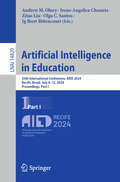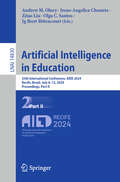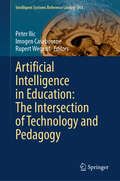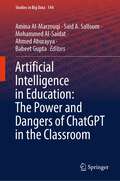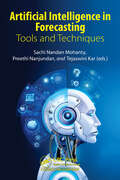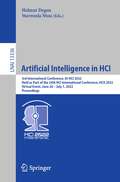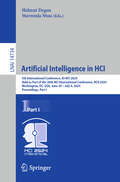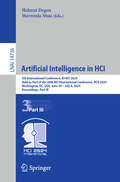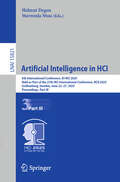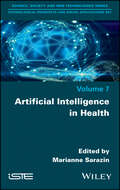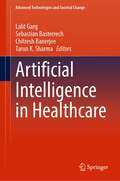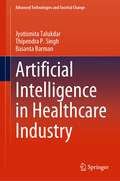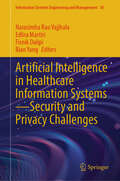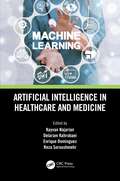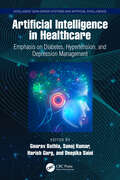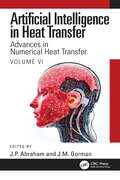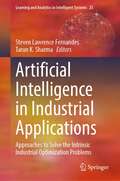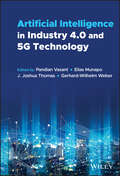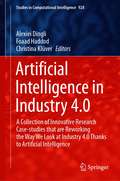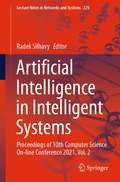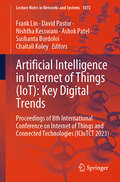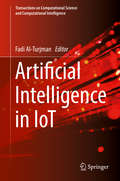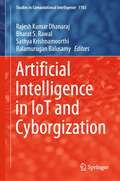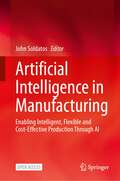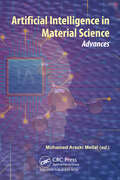- Table View
- List View
Artificial Intelligence in Education: 25th International Conference, AIED 2024, Recife, Brazil, July 8–12, 2024, Proceedings, Part I (Lecture Notes in Computer Science #14829)
by Olga C. Santos Ig Ibert Bittencourt Irene-Angelica Chounta Andrew M. Olney Zitao LiuThis book constitutes the refereed proceedings of the 25th International Conference on Artificial Intelligence in Education, AIED 2024, held in Recife, Brazil, in July 8–12, 2024, Proceedings. The 49 full papers and 27 short papers presented in this book were carefully reviewed and selected from 334 submissions. The papers present results in high-quality research on intelligent systems and the cognitive sciences for the improvement and advancement of education.
Artificial Intelligence in Education: 25th International Conference, AIED 2024, Recife, Brazil, July 8–12, 2024, Proceedings, Part II (Lecture Notes in Computer Science #14830)
by Olga C. Santos Ig Ibert Bittencourt Irene-Angelica Chounta Andrew M. Olney Zitao LiuThis book constitutes the refereed proceedings of the 25th International Conference on Artificial Intelligence in Education, AIED 2024, held in Recife, Brazil, in July 8–12, 2024, Proceedings. The 49 full papers and 27 short papers presented in this book were carefully reviewed and selected from 334 submissions. The papers present result in high-quality research on intelligent systems and the cognitive sciences for the improvement and advancement of education.
Artificial Intelligence in Education: The Intersection of Technology and Pedagogy (Intelligent Systems Reference Library #261)
by Rupert Wegerif Peter Ilic Imogen CasebourneThis book offers a multidisciplinary perspective on the ways in which the careful integration of AI might enhance learning outcomes. By inviting dialogue between engineering (what is possible) and pedagogy (what might be desirable), the book offers a holistic view of AI's potential for education. Offering both case studies of practical implementation and pedagogically informed frameworks, it focuses on appropriately integrating technology for educational benefit, presenting a uniquely broad view. The contributors, who are both educators and technically proficient, bring insights into teaching and assessment approaches, research questions, and technological affordances or constraints. Essential for researchers, educators, and policymakers navigating the rapidly evolving educational technology landscape as AI becomes increasingly prevalent in every aspect of life.
Artificial Intelligence in Education: The Power and Dangers of ChatGPT in the Classroom (Studies in Big Data #144)
by Amina Al-Marzouqi Said A. Salloum Mohammed Al-Saidat Ahmed Aburayya Babeet GuptaThis book aims to bring together a collection of innovative and cutting-edge research that addresses the various challenges in the application and theoretical aspects of ChatGPT in education. ChatGPT is a large language model developed by OpenAI that has the ability to generate human-like text based on a prompt. This has significant potential for use in the field of education, as it allows for the creation of personalized, interactive learning experiences, automating assessment and grading, and more. In e-learning, ChatGPT is used to provide instant feedback and support to students, as well as generate interactive conversations in the target language for language learning. It is also integrated with existing learning management systems and educational technology platforms to enhance their capabilities. In research, ChatGPT is used for natural language processing and sentiment analysis to gather insights on student learning experiences and educational outcomes. However, it is important to note that there are also ethical and privacy concerns that come with using language models like ChatGPT in education, such as data protection and the potential for bias. Overall, the use of ChatGPT in education has the potential to revolutionize the way we learn, teach, and access information. The book seeks to publish original manuscripts that cover a broad range of topics, from the development of new chatbot technologies and their integration into the classroom, to the examination of the ethical and pedagogical implications of these systems. By compiling the latest developments in the field and highlighting new areas for exploration, this book provides valuable insights and perspectives for researchers, educators, and practitioners working in the field of ChatGPT and education. The ultimate goal is to advance the understanding of ChatGPT and its role in education and to promote its effective and responsible use in the classroom and beyond.
Artificial Intelligence in Forecasting: Tools and Techniques
by Sachi Nandan Mohanty Preethi Nanjundan Tejaswini KarForecasting deals with the uncertainty of the future. To be effective, forecasting models should be timely available, accurate, reliable, and compatible with existing database. Accurate projection of the future is of vital importance in supply chain management, inventory control, economic condition, technology, growth trend, social change, political change, business, weather forecasting, stock price prediction, earthquake prediction, etc. AI powered tools and techniques of forecasting play a major role in improving the projection accuracy. The software running AI forecasting models use machine learning to improve accuracy. The software can analyse the past data and can make better prediction about the future trends with higher accuracy and confidence that favours for making proper future planning and decision. In other words, accurate forecasting requires more than just the matching of models to historical data.The book covers the latest techniques used by managers in business today, discover the importance of forecasting and learn how it's accomplished. Readers will also be familiarised with the necessary skills to meet the increased demand for thoughtful and realistic forecasts.
Artificial Intelligence in HCI: 3rd International Conference, AI-HCI 2022, Held as Part of the 24th HCI International Conference, HCII 2022, Virtual Event, June 26 – July 1, 2022, Proceedings (Lecture Notes in Computer Science #13336)
by Helmut Degen Stavroula NtoaThis book constitutes the refereed proceedings of the Third International Conference on Artificial Intelligence in HCI, AI-HCI 2022, which was held as part of HCI International 2022 and took place virtually during June 26 – July 1, 2022. A total of 1271 papers and 275 posters included in the 39 HCII 2022 proceedings volumes. AI-HCI 2022 includes a total of 39 papers; they are grouped thematically as follows: Human-Centered AI; Explainable and Trustworthy AI; UX Design and Evaluation of AI-Enabled Systems; AI Applications in HCI.
Artificial Intelligence in HCI: 5th International Conference, AI-HCI 2024, Held as Part of the 26th HCI International Conference, HCII 2024, Washington, DC, USA, June 29 – July 4, 2024, Proceedings, Part I (Lecture Notes in Computer Science #14734)
by Helmut Degen Stavroula NtoaThe three-volume book set LNAI 14734, 14735, and 14736 constitutes the refereed proceedings of 5th International Conference on Artificial Intelligence in HCI, AI-HCI 2024, held as part of the 26th International Conference, HCI International 2024, which took place in Washington, DC, USA, during June 29-July 4, 2024. The total of 1271 papers and 309 posters included in the HCII 2024 proceedings was carefully reviewed and selected from 5108 submissions. The AI-HCI 2024 proceedings were organized in the following topical sections: Part I: Human-centered artificial intelligence; explainability and transparency; AI systems and frameworks in HCI; Part II: Ethical considerations and trust in AI; enhancing user experience through AI-driven technologies; AI in industry and operations; Part III: Large language models for enhanced interaction; advancing human-robot interaction through AI; AI applications for social impact and human wellbeing.
Artificial Intelligence in HCI: 5th International Conference, AI-HCI 2024, Held as Part of the 26th HCI International Conference, HCII 2024, Washington, DC, USA, June 29–July 4, 2024, Proceedings, Part III (Lecture Notes in Computer Science #14736)
by Helmut Degen Stavroula NtoaThe three-volume book set LNAI 14734, 14735, and 14736 constitutes the refereed proceedings of 5th International Conference on Artificial Intelligence in HCI, AI-HCI 2024, held as part of the 26th International Conference, HCI International 2024, which took place in Washington, DC, USA, during June 29-July 4, 2024. The total of 1271 papers and 309 posters included in the HCII 2024 proceedings was carefully reviewed and selected from 5108 submissions. The AI-HCI 2024 proceedings were organized in the following topical sections: Part I: Human-centered artificial intelligence; explainability and transparency; AI systems and frameworks in HCI; Part II: Ethical considerations and trust in AI; enhancing user experience through AI-driven technologies; AI in industry and operations; Part III: Large language models for enhanced interaction; advancing human-robot interaction through AI; AI applications for social impact and human wellbeing.
Artificial Intelligence in HCI: 6th International Conference, AI-HCI 2025, Held as Part of the 27th HCI International Conference, HCII 2025, Gothenburg, Sweden, June 22–27, 2025, Proceedings, Part III (Lecture Notes in Computer Science #15821)
by Helmut Degen Stavroula NtoaThe four-volume set LNAI 15819–15822 constitutes the thoroughly refereed proceedings of the 6th International Conference on Artificial Intelligence in HCI, AI-HCI 2025, held as part of the 27th International Conference, HCI International 2025, which took place in Gothenburg, Sweden, June 22-17, 2025. The total of 1430 papers and 355 posters included in the HCII 2025 proceedings was carefully reviewed and selected from 7972 submissions. The papers have been organized in topical sections as follows: Part I: Trust and Explainability in Human-AI Interaction; User Perceptions, Acceptance, and Engagement with AI; UX and Socio-Technical Considerations in AI Part II: Bias Mitigation and Ethics in AI Systems; Human-AI Collaboration and Teaming; Chatbots and AI-Driven Conversational Agents; AI in Language Processing and Communication. Part III: Generative AI in HCI; Human-LLM Interactions and UX Considerations; Everyday AI: Enhancing Culture, Well-Being, and Urban Living. Part IV: AI-Driven Creativity: Applications and Challenges; AI in Industry, Automation, and Robotics; Human-Centered AI and Machine Learning Technologies.
Artificial Intelligence in Health
by Marianne SarazinUndeniable, inescapable, exhilarating and breaking free from the exclusive domain of science, artificial intelligence has become our main preoccupation. A major generator of new mathematical thinking, AI is the result of easy access to information and data, as facilitated by computer technology. Big Data has come to be seen as an unlimited source of knowledge, the use of which is still being fully explored, but its industrialization has swiftly followed in the footsteps of mathematicians; today's tools are increasingly designed to replace human beings, which comes with social and philosophical consequences. Drawing on examples of scientific work and the insights of experts, this book offers food for thought on the consequences and future of AI technology in education, health, the workplace and aging.
Artificial Intelligence in Healthcare (Advanced Technologies and Societal Change)
by Tarun K. Sharma Chitresh Banerjee Lalit Garg Sebastian BasterrechThis book highlights the analytics and optimization issues in healthcare systems, proposes new approaches, and presents applications of innovative approaches in real facilities. In the past few decades, there has been an exponential rise in the application of swarm intelligence techniques for solving complex and intricate problems arising in healthcare. The versatility of these techniques has made them a favorite among scientists and researchers working in diverse areas. The primary objective of this book is to bring forward thorough, in-depth, and well-focused developments of hybrid variants of swarm intelligence algorithms and their applications in healthcare systems.
Artificial Intelligence in Healthcare Industry (Advanced Technologies and Societal Change)
by Jyotismita Talukdar Thipendra P. Singh Basanta BarmanThis book presents a systematic evolution of artificial intelligence (AI), its applications, challenges and solutions in the field of healthcare. The book mainly covers the foundations and various methods of learning in artificial intelligence with its application in healthcare industry. This book provides a comprehensive introduction to data analysis using AI as a tool in the generation, normalization and analysis of healthcare data in association with several evaluation techniques and accuracy measurements. The book is divided into three major sections describing the basic foundations of AI and its associated algorithms, history of artificial intelligence in healthcare, recent developments and several modeling techniques for the same. The last section of the book provides insights into several implementations and methods of evaluation and accuracy prediction for healthcare analysis in AI. Extensive use of data for analysis and prediction using several technologies has transformed the lives of normal people indirectly effecting our process to communicate, learn, work and socialize within the society. Thus, the book also provides an insight into the ethics of AI that is very vital in the process of implementation and evaluation of healthcare data. The book provides an organized analysis to a considerable part of data in a digitized society. In view of this, it covers the theory, methodology, perfection and verification of empirical work for health-related data processing. Particular attention is devoted to in-depth experiments and applications.
Artificial Intelligence in Healthcare Information Systems—Security and Privacy Challenges (Information Systems Engineering and Management #34)
by Narasimha Rao Vajjhala Edlira Martiri Fisnik Dalipi Bian Yang“Artificial Intelligence (AI) in Healthcare Information Systems: Security and Privacy Challenges” offers a deep dive into the integration of AI in healthcare, with a primary focus on addressing the significant security and privacy concerns that arise in this domain. The chapters in this book highlight the transformative potential of AI in diagnosing and predicting diseases, as well as its impact on fields like fetal medicine, but places special emphasis on the need for robust encryption, data protection techniques, and ethical considerations to safeguard sensitive healthcare data. The book also explores global case studies, from India to Kazakhstan, outlining the challenges and prospects of AI adoption in diverse healthcare settings. Readers will gain insights into AI's role in improving patient outcomes while navigating the complexities of data privacy and security. The book is a valuable resource for healthcare professionals, technologists, and policymakers who are focused on implementing AI-driven solutions securely and ethically in healthcare systems.
Artificial Intelligence in Healthcare and Medicine
by Kayvan NajarianThis book provides a comprehensive overview of the recent developments in clinical decision support systems, precision health, and data science in medicine. The book targets clinical researchers and computational scientists seeking to understand the recent advances of artificial intelligence (AI) in health and medicine. Since AI and its applications are believed to have the potential to revolutionize healthcare and medicine, there is a clear need to explore and investigate the state-of-the-art advancements in the field. This book provides a detailed description of the advancements, challenges, and opportunities of using AI in medical and health applications. Over 10 case studies are included in the book that cover topics related to biomedical image processing, machine learning for healthcare, clinical decision support systems, visualization of high dimensional data, data security and privacy, bioinformatics, and biometrics. The book is intended for clinical researchers and computational scientists seeking to understand the recent advances of AI in health and medicine. Many universities may use the book as a secondary training text. Companies in the healthcare sector can greatly benefit from the case studies covered in the book. Moreover, this book also: Provides an overview of the recent developments in clinical decision support systems, precision health, and data science in medicine Examines the advancements, challenges, and opportunities of using AI in medical and health applications Includes 10 cases for practical application and reference Kayvan Najarian is a Professor in the Department of Computational Medicine and Bioinformatics, Department of Electrical Engineering and Computer Science, and Department of Emergency Medicine at the University of Michigan, Ann Arbor. Delaram Kahrobaei is the University Dean for Research at City University of New York (CUNY), a Professor of Computer Science and Mathematics, Queens College CUNY, and the former Chair of Cyber Security, University of York. Enrique Domínguez is a professor in the Department of Computer Science at the University of Malaga and a member of the Biomedical Research Institute of Malaga. Reza Soroushmehr is a Research Assistant Professor in the Department of Computational Medicine and Bioinformatics and a member of the Michigan Center for Integrative Research in Critical Care, University of Michigan, Ann Arbor.
Artificial Intelligence in Healthcare: Emphasis on Diabetes, Hypertension, and Depression Management (Intelligent Data-Driven Systems and Artificial Intelligence)
by Harish Garg Deepika Saini Gourav Bathla Sanoj KumarThis book presents state-of-the-art research works for a better understanding of the advantages and limitations of AI techniques in the field of healthcare. It will further discuss artificial intelligence applications in depression, hypertension and diabetes management. The text also presents an artificial intelligence chatbot for depression, diabetes, and hypertension self-help.This book: Provides a structured overview of recent developments of artificial intelligence applications in the healthcare sector. Presents an in-depth understanding of how artificial intelligence techniques can be applied to diabetes management. Showcases supervised learning techniques based on datasets for depression management. Discusses artificial intelligence chatbot for diabetes, depression, and hypertension self-care. Highlights the importance of artificial intelligence in managing and predicting diabetes, hypertension, and depression. The text is primarily written for senior undergraduate, graduate students, and academic researchers in diverse fields including electrical engineering, electronics and communications engineering, computer science and engineering, and biomedical engineering.
Artificial Intelligence in Heat Transfer: Advances in Numerical Heat Transfer Volume VI
by J. M. Gorman J. P. AbrahamArtificial Intelligence in Heat Transfer shows how artificial intelligence (AI) tools and techniques, such as artificial neural networks, machine learning algorithms, genetic algorithms, etc., provide practical benefits specific to thermal sciences. It presents case studies involving heat and mass transfer, multi-objective optimization, conjugate heat transfer, nanofluids, thermal radiation, heat transfer through porous media (metal foam), and more.Drawing on the collective expertise of leading researchers and experts in multiple fields, the book provides an in-depth understanding of the possibilities that emerge when these tools are applied to problems related to thermal sciences. AI is an ever-evolving discipline that has created new and groundbreaking opportunities to advance the mechanical engineering field, particularly in the area of numerical heat transfer. This volume, Advances in Numerical Heat Transfer, explores various ways AI is used in heat transfer to solve engineering problems.This book will serve as an important resource for upper-level undergraduate students, researchers, engineers, and professionals, equipping them with the knowledge and inspiration to push the boundaries of the thermal sciences through AI-driven tools and techniques.
Artificial Intelligence in Industrial Applications: Approaches to Solve the Intrinsic Industrial Optimization Problems (Learning and Analytics in Intelligent Systems #25)
by Tarun K. Sharma Steven Lawrence FernandesThis book highlights the analytics and optimization issues in industry, to propose new approaches, and to present applications of innovative approaches in real facilities. In the past few decades there has been an exponential rise in the application of artificial intelligence for solving complex and intricate problems arising in industrial domain. The versatility of these techniques have made them a favorite among scientists and researchers working in diverse areas. The book is edited to serve a broad readership, including computer scientists, medical professionals, and mathematicians interested in studying computational intelligence and their applications. It will also be helpful for researchers, graduate and undergraduate students with an interest in the fields of Artificial Intelligence and Industrial problems. This book will be a useful resource for researchers, academicians as well as professionals interested in the highly interdisciplinary field of Artificial Intelligence.
Artificial Intelligence in Industry 4.0 and 5G Technology
by Pandian Vasant Gerhard-Wilhelm Weber Elias Munapo J. Joshua ThomasArtificial Intelligence in Industry 4.0 and 5G Technology Explores innovative and value-added solutions for application problems in the commercial, business, and industry sectors As the pace of Artificial Intelligence (AI) technology innovation continues to accelerate, identifying the appropriate AI capabilities to embed in key decision processes has never been more critical to establishing competitive advantage. New and emerging analytics tools and technologies can be configured to optimize business value, change how an organization gains insights, and significantly improve the decision-making process across the enterprise. Artificial Intelligence in Industry 4.0 and 5G Technology helps readers solve real-world technological engineering optimization problems using evolutionary and swarm intelligence, mathematical programming, multi-objective optimization, and other cutting-edge intelligent optimization methods. Contributions from leading experts in the field present original research on both the theoretical and practical aspects of implementing new AI techniques in a variety of sectors, including Big Data analytics, smart manufacturing, renewable energy, smart cities, robotics, and the Internet of Things (IoT). Presents detailed information on meta-heuristic applications with a focus on technology and engineering sectors such as smart manufacturing, smart production, innovative cities, and 5G networks. Offers insights into the use of metaheuristic strategies to solve optimization problems in business, economics, finance, and industry where uncertainty is a factor. Provides guidance on implementing metaheuristics in different applications and hybrid technological systems. Describes various AI approaches utilizing hybrid meta-heuristics optimization algorithms, including meta-search engines for innovative research and hyper-heuristics algorithms for performance measurement. Artificial Intelligence in Industry 4.0 and 5G Technology is a valuable resource for IT specialists, industry professionals, managers and executives, researchers, scientists, engineers, and advanced students an up-to-date reference to innovative computing, uncertainty management, and optimization approaches.
Artificial Intelligence in Industry 4.0: A Collection of Innovative Research Case-studies that are Reworking the Way We Look at Industry 4.0 Thanks to Artificial Intelligence (Studies in Computational Intelligence #928)
by Christina Klüver Alexiei Dingli Foaad HaddodThis book is intended to help management and other interested parties such as engineers, to understand the state of the art when it comes to the intersection between AI and Industry 4.0 and get them to realise the huge possibilities which can be unleashed by the intersection of these two fields. We have heard a lot about Industry 4.0, but most of the time, it focuses mainly on automation. In this book, the authors are going a step further by exploring advanced applications of Artificial Intelligence (AI) techniques, ranging from the use of deep learning algorithms in order to make predictions, up to an implementation of a full-blown Digital Triplet system. The scope of the book is to showcase what is currently brewing in the labs with the hope of migrating these technologies towards the factory floors. Chairpersons and CEOs must read these papers if they want to stay at the forefront of the game, ahead of their competition, while also saving huge sums of money in the process.
Artificial Intelligence in Intelligent Systems: Proceedings of 10th Computer Science On-line Conference 2021, Vol. 2 (Lecture Notes in Networks and Systems #229)
by Radek SilhavyThis book constitutes the refereed proceedings of the artificial intelligence in intelligent systems section of the 10th Computer Science Online Conference 2021 (CSOC 2021), held online in April 2021. Artificial intelligence in intelligent systems topics are presented in this book. Modern hybrid and bio-inspired algorithms and their application are discussed in selected papers.
Artificial Intelligence in Internet of Things: Proceedings of 8th International Conference on Internet of Things and Connected Technologies (ICIoTCT 2023) (Lecture Notes in Networks and Systems #1072)
by Ashok Patel Nishtha Kesswani Sushanta Bordoloi Frank Lin David Pastor Chaitali KoleyThis book is a collection of high-quality research papers presented at 8th International Conference on Internet of Things and Connected Technologies (ICIoTCT 2023), held at National Institute of Technology (NIT), Mizoram, India, during 29–30 September 2023. This book presents recent advances on IoT and connected technologies. This book is designed for marketing managers, business professionals, researchers, academicians, and graduate-level students seeking to learn how IoT and connecting technologies increase the amount of data gained through devices, enhance customer experience, and widen the scope of IoT analytics in enhancing customer marketing outcomes.
Artificial Intelligence in IoT (Transactions on Computational Science and Computational Intelligence)
by Fadi Al-TurjmanThis book provides an insight into IoT intelligence in terms of applications and algorithmic challenges. The book is dedicated to addressing the major challenges in realizing the artificial intelligence in IoT-based applications including challenges that vary from cost and energy efficiency to availability to service quality in multidisciplinary fashion. The aim of this book is hence to focus on both the algorithmic and practical parts of the artificial intelligence approaches in IoT applications that are enabled and supported by wireless sensor networks and cellular networks. Targeted readers are from varying disciplines who are interested in implementing the smart planet/environments vision via intelligent wireless/wired enabling technologies.Includes the most up-to-date research and applications related to IoT artificial intelligence (AI);Provides new and innovative operational ideas regarding the IoT artificial intelligence that help advance the telecommunications industry;Presents AI challenges facing the IoT scientists and provides potential ways to solve them in critical daily life issues.
Artificial Intelligence in IoT and Cyborgization (Studies in Computational Intelligence #1103)
by Balamurugan Balusamy Bharat S. Rawal Rajesh Kumar Dhanaraj Sathya KrishnamoorthiThis book introduces the concept of combining artificial intelligence (AI) and Internet of things (IoT) with real human organs to form a cybernetic organism or cyborg. It is a concept of man–machine mixture which helps in restoring or enhancing the ability of a body part by integrating some technology or artificial component with that body part. These smart artificial organs act as a substitute for real organs having various capabilities like scanning the body, detecting and transmitting the diagnostic data to machines. For example, an artificial heart is capable of monitoring the overall health of a person, and lungs can inform the doctor of abnormalities. This book benefits academic researchers and industrialist who work in the field cyborgization and IoT within human bodies.
Artificial Intelligence in Manufacturing: Enabling Intelligent, Flexible and Cost-Effective Production Through AI
by John SoldatosThis open access book presents a rich set of innovative solutions for artificial intelligence (AI) in manufacturing. The various chapters of the book provide a broad coverage of AI systems for state of the art flexible production lines including both cyber-physical production systems (Industry 4.0) and emerging trustworthy and human-centered manufacturing systems (Industry 5.0). From a technology perspective, the book addresses a wide range of AI paradigms such as deep learning, reinforcement learning, active learning, agent-based systems, explainable AI, industrial robots, and AI-based digital twins. Emphasis is put on system architectures and technologies that foster human-AI collaboration based on trusted interactions between workers and AI systems. From a manufacturing applications perspective, the book illustrates the deployment of these AI paradigms in a variety of use cases spanning production planning, quality control, anomaly detection, metrology, workers’ training, supply chain management, as well as various production optimization scenarios. This is an open access book.
Artificial Intelligence in Material Science: Advances
by Mohamed Arezki MellalArtificial intelligence (AI) in the form of machine learning and nature-inspired optimization algorithms are vastly used in material science. These techniques improve many quality metrics, such as reliability and ergonomics.This book highlights the recent challenges in this field and helps readers to understand the subject and develop future works. It reviews the latest methods and applications of AI in material science. It covers a wide range of topics, including Material processing; Properties prediction; Conventional machining, such as turning, boring, grinding, and milling; non-conventional machining, such as electrical discharge machining, electrochemical machining, laser machining, plasma machining, ultrasonic machining, chemical machining, and water-jet machining; Machine tools, such as programming, design, and maintenance. AI techniques reviewed in the book include Machine learning, Fuzzy logic, Genetic algorithms, Particle swarm optimization, Cuckoo search, Grey wolf optimizer, and Ant colony optimization.
